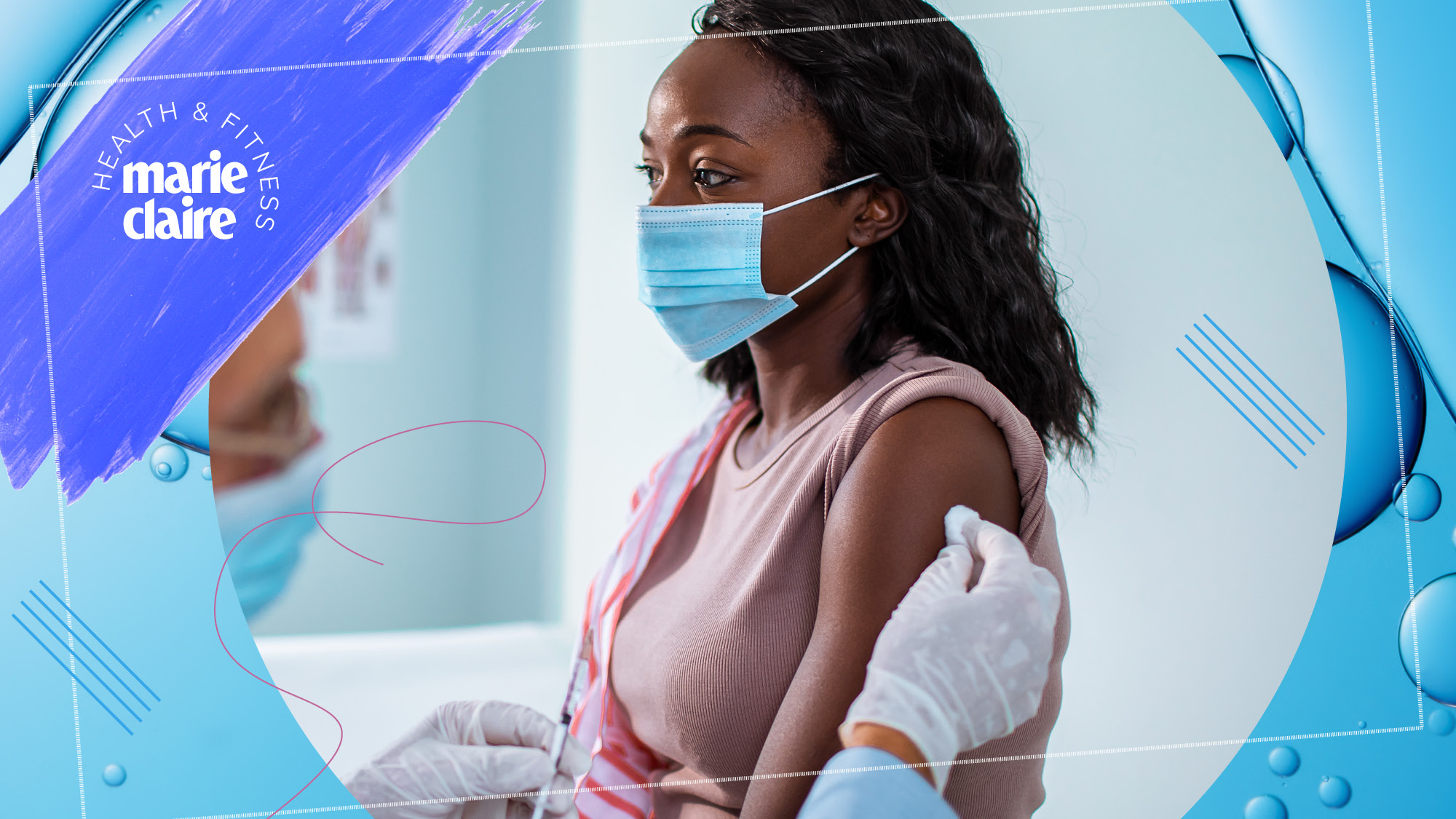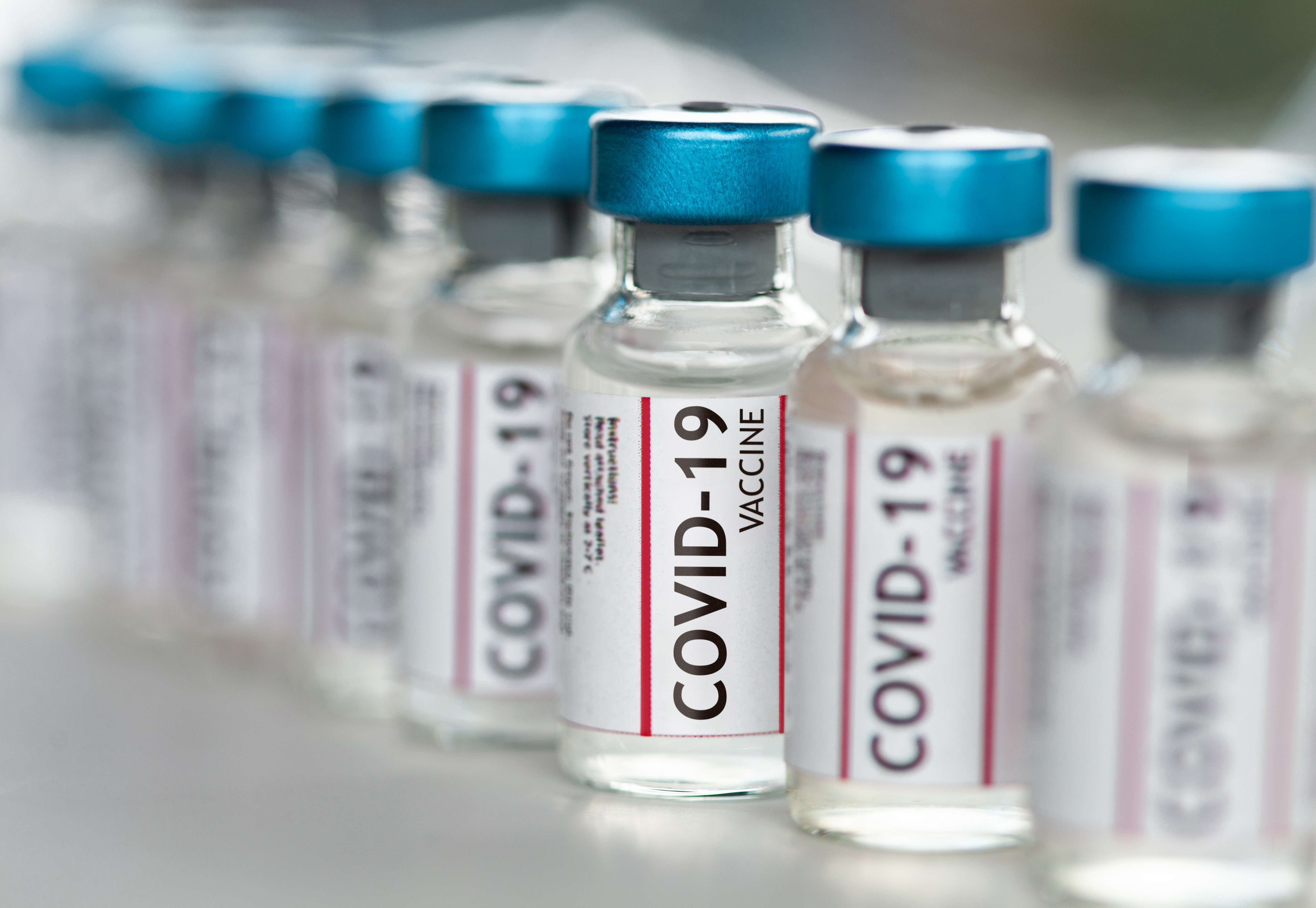
Celebrity news, beauty, fashion advice, and fascinating features, delivered straight to your inbox!
You are now subscribed
Your newsletter sign-up was successful
We enlisted three medical experts with dispelling the myths and misinformation and breaking down the current evidence
In November, the world let out a sigh of relief as news broke that the first COVID vaccine had been developed. Again, when the first dose was administered in December, to 90-year-old Margaret Keenan in her hometown of Coventry, you felt the nation's shoulders relax a little.
And yet, there's a lot of noise at the moment about said vaccine and how it may affect women's fertility - so much so, that research from Yoppie found that 26% of women are worried the vaccine might have an impact on their ability to conceive.
But, in news this week: new research published in F&S Reports, part of the Fertility and Sterility family of journals, concludes that the COVID-19 vaccine do not cause infertility or increase the risk of miscarriage.
It's no longer just expert opinion - the first peer-reviewed, clinical trial on the COVID vaccine and fertility has now been published.
COVID vaccine and fertility: So why were women worried?
Three things: social media, misinformation, and, to a certain extent, scaremongering. Last year, rumours circulated online that the head research developer at Pfizer had called the developed vaccine 'female sterilisation'. In reality, the man, Michael Yeadon, left the company in 2011 and didn't work in vaccine development when he was employed there.
Anti-vaxxers have been regularly sharing misinformation on platforms with thousands (and even sometimes millions) of followers. It'd be understandable if the COVID vaccines hadn't been through the exact same testing process as every other vaccine currently available in the UK, but as our team of experts are about to point out, it has - just far quicker.
Celebrity news, beauty, fashion advice, and fascinating features, delivered straight to your inbox!
Doctors have maintained throughout that there is no scientific evidence to show that the COVID vaccine and fertility - or infertility - are linked. The Royal College of Obstetricians and Gynaecologists (RCOG) and the Royal College of Midwives (RCM) addressing the 'misinformation circulating' in a statement.
The official stance
Interested in the official stance? Well, in the RCOG statement mentioned above, released earlier this year, their president, doctor Edward Morris, said: “We want to reassure women there is no evidence to suggest that COVID-19 vaccines will affect fertility. Claims of any effect of COVID-19 vaccination on fertility are speculative and not supported by any data."
“There is no biologically plausible mechanism by which current vaccines would cause any impact on women's fertility. Evidence has not been presented that women who have been vaccinated have gone on to have fertility problems."
Both the UK Medical and Healthcare products Regulatory Agency (MHRA) and the Joint Committee on Vaccination and Immunisation (JCVI) have shared their approval of the vaccine. They've raised no concerns over it's link to fertility.

What evidence is there that the COVID vaccine and fertility are linked, or that it causes sterilisation?
According to GP doctor Sayyada Mawji, not an awful lot. "There's no evidence, as of yet, that any women who've been vaccinated have gone on to have fertility problems," she shares.
GP doctor Chintal Patel agrees, although does share that the green book, which holds information and advice on all vaccines in the UK, in January when this article was first published, did 'not recommend vaccinating women who are pregnant or trying to conceive.' Why? "Not because it is known to be dangerous, but because we don’t have the data to recommend routine use during pregnancy," she explains.
Now, the NHS website states: "All adults aged 18 or over can now get vaccinated against COVID-19."
"At the moment, there’s a lot of new information and guidance about the effects of the vaccine on fertility, as well as a lot of rumours and misinformation spreading online," doctor Sayyada explains. "People are understandably worried because it's impossible to know where to turn. That’s why we’re glad that Marie Claire UK is using its platform to invite medical experts to dispel the myths and misinformation by sharing the current evidence we have."
What are the two main causes for concern?
Because of how quickly the COVID vaccine was developed
Number one: the vaccine has only recently been developed. Vaccines normally undergo scientific testing for years before being administered to the general public, and so many are apprehensive to have a vaccine that hasn't had as much test time administered.
"It was developed in about ten months," shares doctor Zoe Williams. "I can assure you they've been through every single safety test things like the flu vaccine, for example, has. It's just all of those test have been fast-tracked. There have been zero financial restrictions - it normally takes years to get the funding for developing these vaccines," she explains.
Because of the spike protein in the COVID vaccine
There's also worry about a protein on the surface of the COVID virus called a spike protein. "There is a very small part of the spike protein that resembles a protein which is involved in the formation of the placenta, called synctin-1, raising concerns that the body could raise an immune response against the placenta and stop it forming," explains doctor Alka.
However, in her professional opinion, the whole proteins aren't identical, and so 'are very unlikely' to confuse your body’s immune system. "There is no immunological basis for the concerns that your body would confuse the placenta proteins for COVID proteins", she says.
If you don't get it, don't worry. Doctor Alka explains that it's like 'two people having the same letters in their name.' "You wouldn't call to Alfie and expect Albert to turn around, even if both names have the same letters," she shares.
Did anyone get pregnant during the COVID vaccination trials?
Good question. "Of note, during the vaccine trials, 23 people did become pregnant during the trial, twelve who had received the vaccine and eleven who had not," doctor Alka explains.
It's a significant, if small, implication that there's s no difference in the fertility rates amongst the vaccinated or unvaccinated groups. It highlights that women who received the vaccine were able to fall pregnant without additional complications, though the numbers are small, she admits.
What does the new study state?
In short, that the concerns about any risk of female sterility are unfounded.
Using a frozen embryo transfer as a model to compare implantation rates, the scientists found 'no difference' in serum hCG documented implantation rates or sustained implantation rates between the groups.
"The concern regarding Covid vaccines or illness causing female sterility are unfounded," concludes the study.

Worried and considering not getting the COVID vaccine? Read this
You know that COVID-19 can have a long-term and lasting impact on your health. You also know that the vaccine can help to prevent this, and how important it is to make an informed decision using the latest evidence and data. Still worried? Let the experts guide you.
1. Talk to your GP
"If you're worried and considering not getting the vaccine, do a risk assessment. You should discuss with your GP or healthcare professional," she explains. They'll know your full health history and be up to date with the latest verified information and research being produced.
2. Use reliable news sources
As above, the field is constantly changing, with discoveries being made every day. Making sure you're only reading verified sources for your health news is critical. "The RCOG, NHS, and Gov.uk websites, alongside any information from a medical professional, are good places to start," shares Sayyada.
Watch out for GP’s like herself, who'll be continuing to use their social media pages to share evidence-based updates.
3. Give yourself space to acknowledge your concerns
It’s only natural to feel worried, shares doctor Alka. "Give yourself space, but don’t let worries about what you don’t know make the decision for you," she emphasies. Instead, she encourages you to focus on what you do know.
You know that:
- COVID is a severe, life-changing illness.
- Vaccination reduces the severity and impact on life.
- You may experience side effects.
- But, the majority of side effects are mild and self-limiting. (You may experience a fever, tiredness or a heavy arm for one to two days).
- For some, reactions may be more severe.
- We don’t know the long-term effect of vaccination or of COVID itself.
Make your decision based on the present moment, and what you know now, she advises. "What we know is that if we want to be able to co-exist alongside this virus, then we need a protective defence against it. Vaccination provides that."
4. Focus on your general wellbeing
This one's important. Alongside vaccination, it's crucial to focus on your day-to-day lifestyle. Why? Well, to mount a strong defence against COVID and increase your chance of fertility, Alka advises. "Eat well, sleep well, move well, and relax more," she advises. Not sure where to start? Our self-care ideas could help.
What about women who are already pregnant?
At current, pregnant women aren't eligible for vaccination unless they're a front line worker or have an underlying health condition. Doctor Zoe advises all mothers-to-be to speak to their healthcare worker about the right decision for them. It'll be different for everyone.
The RCOG and RCM agree, with RCM chief executive Gill Walton saying: “If you're eligible for a COVID-19 vaccine, the decision whether to have the vaccination is your choice. You can either have the vaccine or wait for more information about the vaccine. Women who are eligible for the vaccination should consider discussing any concerns they have with their midwife or healthcare professional."
Bottom line?
"You're not putting yourself at any more risk getting the COVID vaccine than getting the flu vaccine," explains doctor Zoe. "They are non-live vaccines, meaning they do not contain the vaccine or put it into your body. Plus, there is no evidence to suggest that the vaccine will impact fertility."
If you are at all worried, do visit your GP or book an appointment with a healthcare professional. That's what they're there for, after all.

Ally is Marie Claire UK's Senior Health and Sustainability Editor, a well-regarded wellness expert, ten-time marathoner, and Boston Qualifying runner.
Utilising her impressive skillset and exceptional quality of writing, she pens investigative, review and first-person pieces that consistently demonstrate flair and originality.
As well as writing, Ally manages a team of freelancers, oversees all commissioning and strategy for her pillars, and spearheads the brand's annual Women in Sport covers, interviewing and shooting the likes of Mary Earps, Millie Bright, and Ilona Maher. Shortlisted for three BSMEs and winning one in 2022, Ally lives and breathes her verticals: her eye for a story and connections within the wellness sphere are unrivalled. Follow Ally on Instagram for more.
